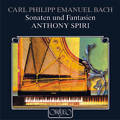ORFEO International – Reviews
Important Releases Briefly Introduced
February 2007
ORFEO 1 CD C 639 061 A
Anthony Spiri
Sonatas and Fantasias by Carl Philipp Emanuel Bach
In the wake of his keen interest in the music of the whole of the Bach family, the pianist Anthony Spiri has long been eager to introduce works by Carl Philipp Emanuel (1714–88) to a wider audience. 
Carl Philipp Emanuel Bach with Anthony SpiriMany of these pieces are barely known, not least because the music is not available in printed form but only in manuscript copies. This is true, for example, of the C minor Sonata H 298, a late piece that features in Orfeo’s new recording alongside three other sonatas and that moves effortlessly between the world of Baroque rhythms and harmonic and melodic writing more typical of the Age of Sensibility. Anthony Spiri’s performance on a modern concert grand impressively reflects the composer’s intermediate position in the history of music – a field of cultural endeavour that so often appears to be divided into arbitrary periods. During his lifetime Johann Sebastian’s second eldest son was highly regarded as the popular “creator of the true art of playing keyboard instruments” – this is certainly how he was seen by Haydn and by both Leopold and Wolfgang Amadeus Mozart. It was a reputation that Carl Philipp Emanuel owed not only to his treatise The True Art of Playing Keyboard Instruments but also to his virtuoso appearances at the court of Frederick the Great, to his appointment as director of music in Hamburg’s five main churches and to his work as the composer of several printed editions of sonatas, rondos and fantasias. 
Anthony Spiri
Foto: ORFEO InternationalThe mastery that Carl Philipp Emanuel was capable of achieving in the field of the fantasia is evident from his free fantasia in F sharp minor H 300 of 1787, which brings to an end Anthony Spiri’s tour of the composer’s output, a tour that starts with the G minor Fantasia H 225 of two decades earlier. Here and elsewhere in this new release, all of Carl Philipp Emanuel’s compositional and interpretative surprises, together with his metrical liberties and the contrastive changes of tempo and sublimely solemn underlying mood that recall his father not least when he quotes the B–A–C–H motif, receive their due in Anthony Spiri’s magisterial and subtle performances, while at the same time casting their spell on the listener.
top |